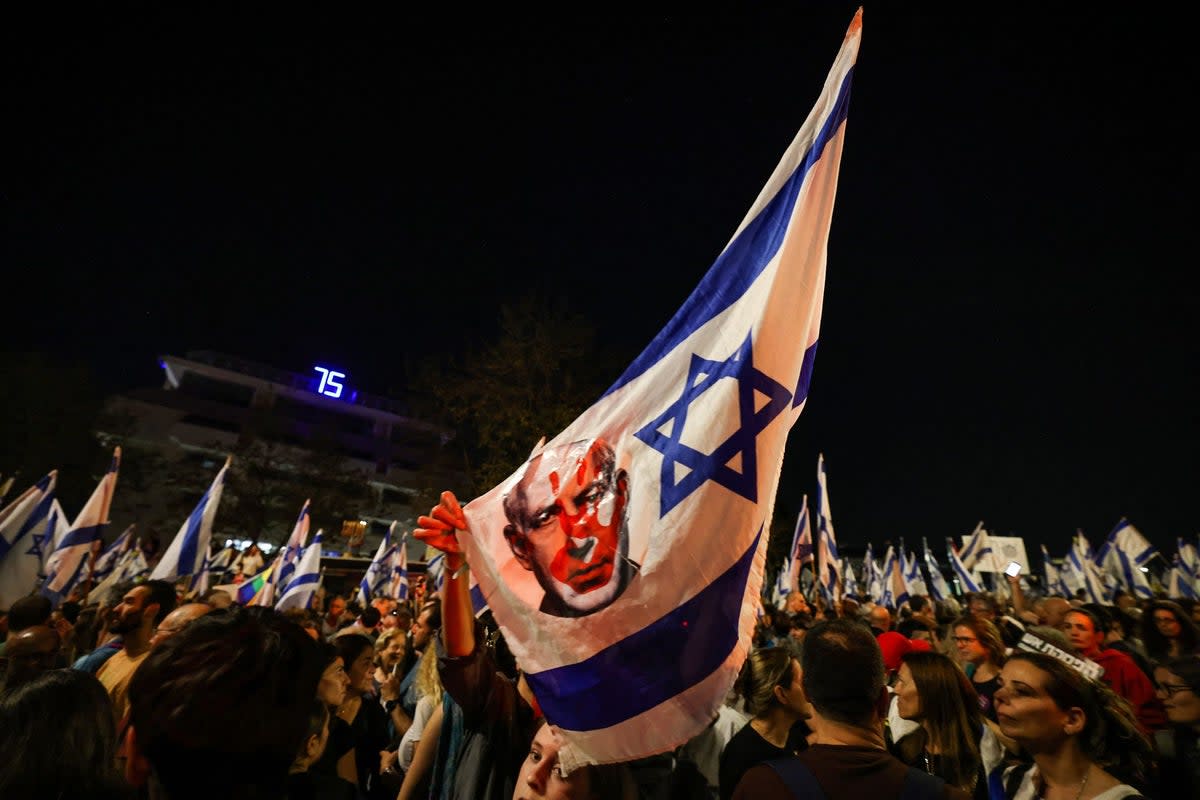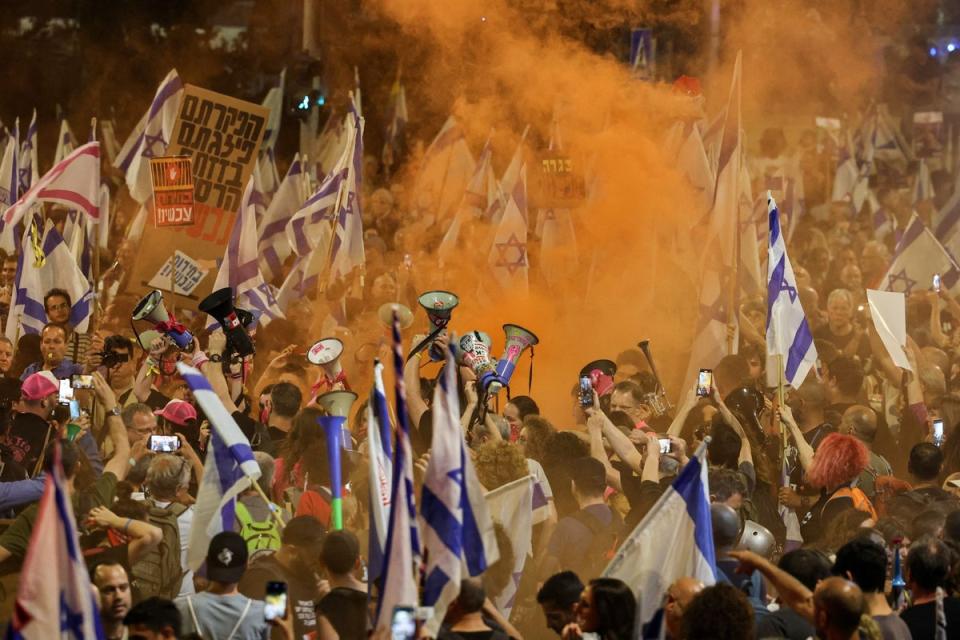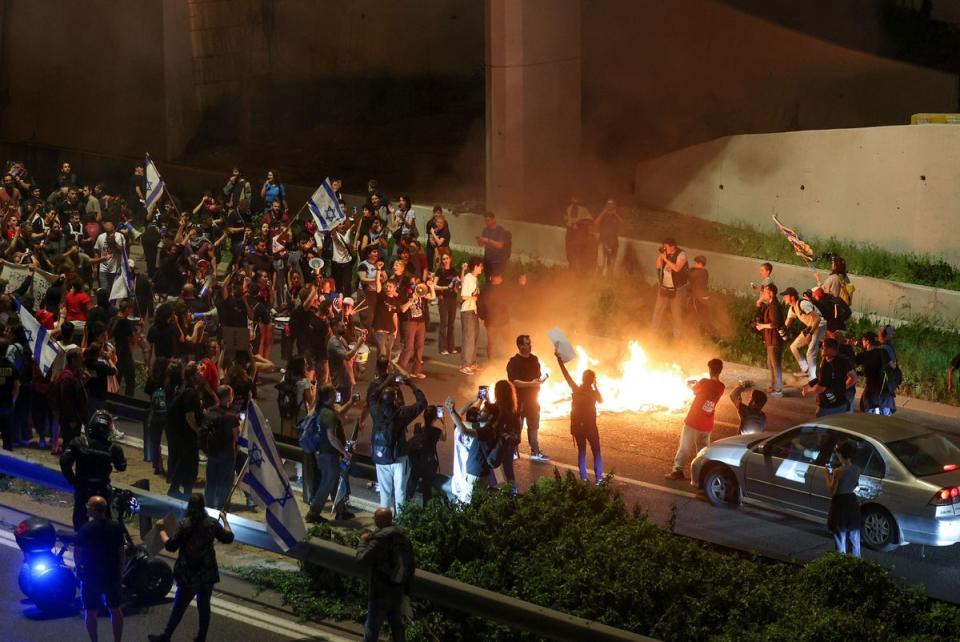Thousands take part in biggest anti-Netanyahu protests since Israel went to war with Hamas

Tens of thousands of Israelis have protested in central Jerusalem in the largest anti-government demonstration since the country went to war in October.
Protesters on Sunday urged the government to reach a ceasefire deal to free dozens of hostages held in Gaza by Hamas militants and to hold early elections.
The crowd stretched for blocks around the Knesset, or parliament building, and organisers vowed to continue the demonstration for several days. They urged the government to hold new elections nearly two years ahead of schedule. Thousands also demonstrated on Sunday in Tel Aviv, where there was a large protest the night before.
Nearly six months of conflict have renewed divisions over the leadership of Prime Minister Benjamin Netanyahu, though the country remains largely in favour of the war sparked when Hamas killed some 1,200 people during a cross-border rampage and took 250 others hostage on October 7.
Mr Netanyahu has vowed to destroy Hamas and bring all the hostages home, yet those goals have been elusive. While Hamas has suffered heavy losses, it remains intact.
Roughly half the hostages in Gaza were released during a week-long ceasefire in November. But attempts by international mediators to bring home the remaining hostages have failed.

“We believe that no hostages will come back with this government because they’re busy putting sticks in the wheels of negotiations for the hostages,” said Boaz Atzili, whose cousin, Aviv Atzili and his wife, Liat, were kidnapped on October 7.
Liat was released but Aviv was killed, and his body is in Gaza. “Netanyahu is only working in his private interests.”
Protesters blame Mr Netanyahu for the failures of October 7 and say the deep political divisions over his attempted judicial overhaul last year weakened Israel ahead of the attack. Some accuse him of damaging relations with the United States, Israel’s most important ally.
Mr Netanyahu is also facing a litany of corruption charges which are slowly making their way through the courts, and critics say his decisions appear to be focused on political survival over the national interest.
Opinion polls show Mr Netanyahu and his coalition trailing far behind their rivals if elections were held today.

Mr Netanyahu, in a nationally televised speech before undergoing hernia surgery later Sunday, said he understood the pain of the families of hostages.
But he said calling new elections - in what he described as a moment before victory - would paralyze Israel for six to eight months and stall the hostage talks.
In his address on Sunday, Mr Netanyahu also repeated his vow for a military ground offensive in Rafah, the southern Gaza city where more than half of territory’s population of 2.3 million now shelters after fleeing fighting elsewhere. “There is no victory without going into Rafah,” he said, adding that US pressure would not deter him. Israel’s military says Hamas battalions remain there.
In another reminder of Israel’s divisions, a group of reservists and retired officers demonstrated in an ultra-Orthodox neighbourhood.

Ultra-Orthodox men for generations have received exemptions from military service, which is compulsory for most Jewish men and women. Resentment over that has deepened during the war. Mr Netanyahu’s government has been ordered to present a new plan for a more equitable draft law by Monday.
Mr Netanyahu, who relies heavily on the support of ultra-Orthodox parties, last week asked for an extension.
The Bank of Israel said in its annual report on Sunday that there could be economic damage if large numbers of ultra-Orthodox men continue not to serve in Israel’s military.
Also on Sunday, an Israeli airstrike hit a tent camp in the courtyard of a crowded hospital in central Gaza, killing two Palestinians and wounding another 15, including journalists working nearby.
An Associated Press reporter filmed the strike and aftermath at Al-Aqsa Martyrs Hospital in Deir al-Balah, where thousands of people have sheltered. The Israeli military said it struck a command center of the Islamic Jihad militant group.
Tens of thousands of people have sought shelter in Gaza’s hospitals, viewing them as relatively safe from airstrikes. Israel accuses Hamas and other militants of operating in and around medical facilities, which Gaza’s health officials deny.
The United Nations and partners warn that famine could occur in devastated, largely isolated northern Gaza. Humanitarian officials say deliveries by sea and air are not enough and that Israel must allow far more aid by road. Egypt has said thousands of trucks are waiting.
Israel says it places no limits on deliveries of humanitarian aid. It has blamed the UN and other international agencies for the failure to distribute more aid.
Gaza’s Health Ministry said Sunday that at least 32,782 Palestinians have been killed since the start of the war. The ministry’s count does not differentiate between civilians and fighters, but it has said that women and children make up around two-thirds of those killed.
Israel says over one third of the dead are militants, though it has not provided evidence, and it blames Hamas for civilian casualties because the group operates in residential areas.


